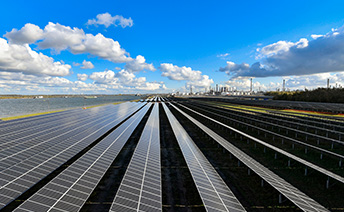Electric Power Supply Association (EPSA)
EPSA is the national trade association for competitive power suppliers in the USA. Its members own and operate more than 150,000 megawatts of power generation capacity in regions with access to competitive wholesale electricity markets.[1]
Membership of board/executive committee: Shell is a member of the board of directors.
- 2022 assessment outcome: Aligned
- 2021 assessment outcome: Some misalignment
Summary
Shell benefits from its membership of EPSA, particularly in relation to power market advocacy.
We have found EPSA to be aligned with our climate and energy transition-related policy positions.
We will encourage EPSA to:
- State support for net-zero emissions by 2050.
- Support improving energy efficiency through standards and regulatory instruments covering key sectors of the economy.
- Support ending approval of investments in new unabated coal power generation. Support phase-out of unabated coal power generation by 2040.
We will remain a member of EPSA. We will continue to engage the association on climate and energy transition topics. We will continue to track alignment between EPSA’s climate and energy transition-related positions and our own.
Further information
Click on the sections below to read more.
Paris Agreement and net-zero emissions
- EPSA has stated that it supports the “ambitions of the Paris Agreement to reduce GHG emissions”.[2]
- EPSA has not stated a position on net-zero emissions.
Carbon pricing
- EPSA has stated support for an “economy-wide price on carbon”.[3]
- In a 2022 statement on the Inflation Reduction Act, EPSA stated that “The IRA continues a longstanding patchwork of federal energy policy, focused on selective decarbonization technologies rather than a holistic market-based approach – such as carbon pricing – that prioritizes reliability and competition.”[4]
Energy efficiency
No position
Decarbonised hydrogen
- In EPSA’s 2022 statement on the passage of the Inflation Reduction Act, it stated that the Act includes “much-needed support to scale-up nascent technologies, like carbon capture and sequestration (CCS) and hydrogen.”[5]
Natural ecosystems
No position
Carbon capture and storage
- EPSA has stated support for policies that support the scale-up of carbon capture and storage.[6]
- In EPSA’s 2022 statement on the passage of the Inflation Reduction Act, it stated that the Act includes “much-needed support to scale-up nascent technologies, like carbon capture and sequestration (CCS) and hydrogen.”[7]
Environmental, social and governance (ESG) standards and benchmarks, sustainable finance taxonomies
- In its 2022 response to the SEC’s proposed climate disclosure rule, EPSA stated support for “an efficient and informative reporting process to provide climate-related transparency to the public, investors, and government”, but noted a number of concerns with the SEC’s proposed rule.[8] Shell stated support for the SEC’s proposal, but also noted a number of concerns.
Coal
No position
Electrification with renewable or low-carbon power
- EPSA has stated support for efforts to combat climate change through a competitive electricity market that allows “all resources to compete to reduce carbon and other harmful emissions”.[9]
- In December 2022 following the White House’s Electrification Summit, EPSA stated that it “strongly maintains that electrification efforts across the economy – from transportation to home/commercial heating, to appliances – are crucial to meeting greenhouse gas reduction efforts”.[10]
- In an August 2022 statement on the Inflation Reduction Act, EPSA stated “it is critical that policymakers put an equal if not greater focus on protecting the reliability of our electric system in tandem with decarbonization efforts”.[11]
Gases and methane
- EPSA has stated that natural gas is essential to ensure reliability as wind and solar resources provide a greater percentage of power.[12]
- In a 2022 EPSA press release discussing the “growing push to electrify ever larger parts of the American economy and decarbonize our energy systems”, EPSA stated that “as demand grows, firm, flexible and low-emitting resources like natural gas will be needed to support the growth of intermittent renewable power.”[13]
- EPSA has not stated a position on direct regulation of methane emissions or ending routine flaring by 2030 or sooner.
Road transport: Passenger cars and vans
No position
Road transport: Heavy-duty vehicles
No position
Heavy industry decarbonisation
No position
Aviation
No position
Shipping
No position
Return to list of associations[1] https://epsa.org/about-epsa/
[2] https://epsa.org/epsa-supports-ambitions-of-the-unfccc-paris-climate-accords/
[3] https://epsa.org/about-epsa/our-principles/
[4] https://epsa.org/epsa-statement-on-the-passage-of-the-inflation-reduction-act-of-2022/
[5] https://epsa.org/epsa-statement-on-the-passage-of-the-inflation-reduction-act-of-2022/
[6] https://epsa.org/epsa-statement-on-the-passage-of-the-inflation-reduction-act-of-2022/
[7] https://epsa.org/epsa-statement-on-the-passage-of-the-inflation-reduction-act-of-2022/
[8] https://epsa.org/wp-content/uploads/2022/06/FINAL_EPSA-Comment-Letter_SEC-Climate-Disclosure-Proposed-Rule_06.17.22499.pdf
[9] https://epsa.org/about-epsa/our-principles/
[10] https://epsa.org/an-electrified-economy-needs-dispatchable-generation-epsas-takeaways-from-the-white-house-electrification-summit/
[11] https://epsa.org/an-electrified-economy-needs-dispatchable-generation-epsas-takeaways-from-the-white-house-electrification-summit/
[12] https://epsa.org/competitive-markets-help-address-reliability-during-energy-transition/
[13] https://epsa.org/new-epsa-poll-with-reliability-and-affordability-topping-energy-priorities-americans-voice-broad-support-for-electric-competition/










